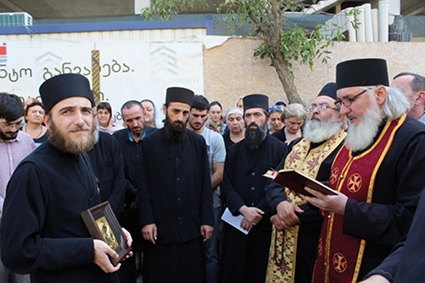Could the Church Become a Catalyst for Change?
The Georgian Orthodox Church massively influences all areas of Georgian life, including politics. With such huge influence comes the opportunity to impact opinions and politics, as well as generate change.
According to a survey by the International Republic Institute in 2017, 88% of Georgians held a favorable view of the church, making it the most trusted organization in the country. In 2012, the National Democratic Institute asked “how important is your religious belief in making daily decisions” to which 36% of Georgians responded “very important”, and 48% said “important”.
The impact of the Church on politics and opinion is easily visible in Georgia. “The perceptions and convictions of highly respected religious leaders help shape the public opinion to a considerable degree,” stated H.E. David Bakradze, Ambassador of Georgia to the USA.
Indeed, in 2013, gay rights activists holding an anti-homophobic rally were met by thousands of protestors, organized and led by the Georgian Orthodox Church. Ilia II of Georgia, the head of the Georgian Church had described homosexuality as an “anomaly and disease” two days earlier, calling for a ban of the rally. The event ended in a clash which resulted in the injuries of multiple people.
Moreover, the recent parliamentary discussions surrounding the legalization of cannabis were halted following opposition from the Church. Father Andria Jamghaidze warned “next we will see similarly liberal approaches to cocaine and heroin.”
Realizing the huge impact of the Church on Georgian life and democracy, government bodies and NGOs are beginning to reach out to the Church. Supported by the UK Governance Fund, the Center for Development and Democracy (CDD) has been working together with the Orthodox Church and leaders of religious groups in Georgia since 2014.
Their work has shown the potential of the Georgian Orthodox Church to make positive changes and hold dialogues. This is especially significant due to the perception that the Church is against discussions and is relatively closed. For example, they organized study visits for a group of religious leaders to Washington D.C., as well as European and Euro-Atlantic institutions. Such visits establish important dialogues which promote both tolerance and collaboration among religious groups in Georgia, whilst also educating the Church and changing misconceptions.
Often associated with anti-western propaganda which claims the Church is pro-Russian, the Church made a big statement by pledging its support to the EU, following the abovementioned visits. The Patriarchate of Georgia made an official statement: “It turned out that both in NATO and the EU, they had the wrong perception about the Georgian Church, and we also had the wrong impression about their policy towards a number of issues. Concerning Georgia’s aspiration to Euro-Atlantic membership, this is the choice of the Georgian people and the Church respects this choice.”
Part of the work of the CDD also includes conducting educational projects such as lectures, workshops and intensive training sessions with representatives and affiliates of the Church as well as the general public and parishioners. Topics such as the Georgia-EU history of relations, international treaties on human rights, and relations of religious organizations and governments in the EU member states were taught by government officials and representatives of diplomatic missions.
Learning about such topics is of incredible importance for the Church, especially due to their massive influence. 93% of the participants said that the information they received was greatly needed and that they would be willing to participate in future educational and awareness-raising activities.
Speaking at the signing ceremony of the Grant Agreement of the project “Supporting Participatory and Inclusive Governance in Mountainous Guria and Adjara” at the British Embassy on November 7, Ketevan Chachava was very positive about the possibility of the Church to become a positive message carrier. Ideas can be better re-laid to the Georgian population through teaching priests about important laws and ideas such as tolerance, human rights, and anti-discrimination. She plans to continue to work closely with the Church and hold regular dialogues to promote this change.
Although such considerable power in a non-elected body is alarming, the recent openness of the Church to embrace dialogues and training could show a shift in attitudes of a Church which has historically been mostly unreachable. The conservative grip of the Church on Georgian society is not likely to loosen in the near future, making continued work with it arguably the most important direction for civil society. The continuation of dialogues and projects supported by the international community shows that positive steps are being made.
By Amy Jones











